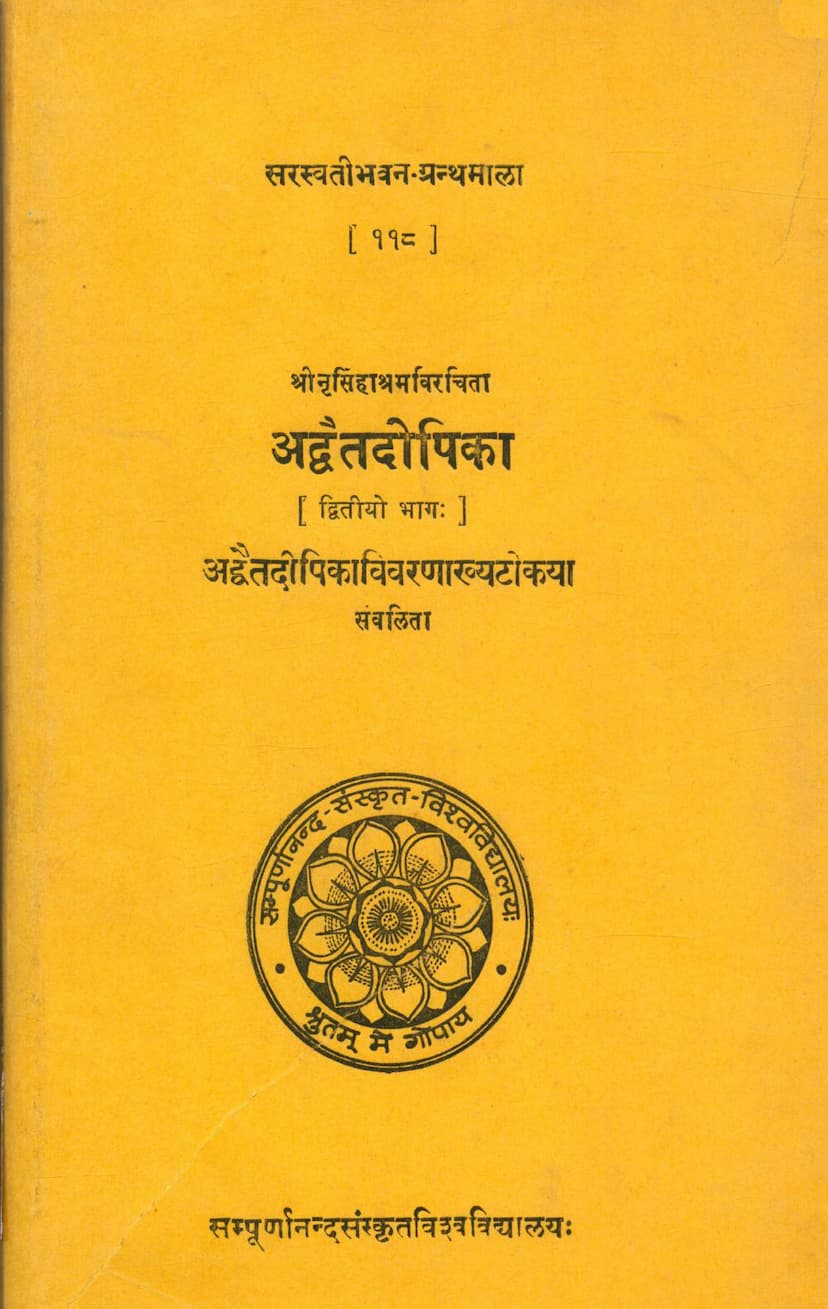Adwait Dipika Part 02
Added to library: September 1, 2025

Summary
This is a summary of the provided Jain text, "Adwait Dipika Part 02" by S Subramanya Shastri, based on the catalog link and the text provided.
Book Title: Adwait Dipika Part 02 (अद्वैतदीपिका द्वितीयो भागः) Author: Nrisimhasrama (श्री नृसिंहाश्रम) Commentary: Advaitadipika Vivaranam by Narayanasrama (श्री नारायणाश्रमविरचिता अद्वैतदीपिकाविवरणाख्यटीकासहिता) Publisher: Sampurnanand Sanskrit University, Varanasi Year of Publication: 1984 (Shaka 1906, Vikram 2041)
Overall Theme: This volume of Adwait Dipika, the second part, focuses on elaborating the non-dualistic (Advaita) philosophy. It aims to counter the arguments of dualists and establish the oneness of the individual soul (Jiva) with the ultimate reality (Brahman). The text delves into intricate philosophical debates, refuting dualistic interpretations of Vedic texts and concepts like perception, inference, and scriptural authority.
Key Themes and Arguments Presented:
-
Identity of Jiva and Brahman (Chapter 02): The second chapter primarily addresses the dualist contention that Jivas are fundamentally different from each other and from the Supreme Lord. The author, Nrisimhasrama, argues against this, asserting the ultimate identity of Jiva with Brahman.
- Critique of Dualistic Arguments: The text systematically analyzes and refutes dualistic proofs for the distinction between Jiva and Brahman.
- Perception: It argues that perception cannot be the ultimate proof for dualism because the Lord is beyond the direct grasp of sensory perception due to His formless, all-pervading nature.
- Inference: Dualists often use arguments based on inferring difference from apparent dissimilarities (e.g., omniscience vs. limited knowledge). The text finds flaws in these inferential arguments, particularly when they contradict the authoritative statements of the Upanishads.
- Interpretation of Scriptural Texts: The book tackles dualistic interpretations of key scriptural passages, such as the "Dva Suparna" (two birds on a tree) analogy. The monistic perspective (Advaita) is presented, explaining that the "two birds" in the scripture do not imply fundamental difference but rather represent the different states or aspects of the same reality (Jiva and Brahman in their empirical and transcendental aspects). The word "two" is explained as referring to an circumstantial or qualified difference, not an essential one.
- Primacy of Sruti (Vedic Texts): A central theme is the supremacy of the Vedas (Sruti) as the ultimate source of knowledge regarding Brahman and the soul. The author emphasizes that Shruti texts, being of divine origin, hold greater authority than human reasoning or empirical observation when it comes to transcendental truths.
- Unreality of the World (Prapancha Mithya): The text asserts the unreality or relative unreality of the perceived universe. It highlights Vedic statements like "Ne'ha nana'sti kincha" (there is no multiplicity here) and "Vacarambhanan" (effects are merely names and forms) to support the monistic view that the phenomenal world, with its perceived differences, ultimately dissolves upon the realization of Brahman consciousness.
- Nature of Erroneous Cognition: The book discusses various philosophical schools' views on illusion (e.g., Naiyayikas' anyathakhyati, Buddhists' voidness) and presents the Advaita Vedanta perspective of anirvacaniya khyati (indescribable or indeterminable perception) for erroneous cognitions. This concept is crucial for explaining how the world of difference and multiplicity is cognized while its ultimate unreality is maintained.
- Unreality of God's Qualities and Form: In the third chapter, the author argues that God, whether identified as Vishnu or Shiva, is ultimately without attributes (Nirguna) and that His form, qualities, and even His perceived mercy are empirically real but ultimately unreal from the absolute perspective.
- Critique of Dualistic Arguments: The text systematically analyzes and refutes dualistic proofs for the distinction between Jiva and Brahman.
-
The Nature of Reality and Illusion (Chapter 03): The third chapter continues the philosophical discourse, focusing on God (Tatpada) and the nature of reality.
- God as Known Only Through Upanishads: It reiterates that God is not demonstrable through mere inference but is solely knowable through the Upanishads.
- Refutation of Inference for God: Arguments against inferring God's existence based on causality (like Nyaya's arguments) are further elaborated, highlighting the logical inconsistencies and the inadequacy of such proofs for the ultimate reality.
- Śruti as the sole authority: The chapter emphasizes the unique role of Śruti in revealing Brahman and His non-dual nature, leading to direct realization.
- Oneness of Brahman: The concept of Brahman's oneness and attributelessness is defended against dualistic interpretations. The author argues that descriptions of Brahman having qualities like "Aditya Varna" (having the appearance of the sun) refer to His self-luminous nature rather than possessing a form in the empirical sense.
- The Maya and Avidya: The text likely discusses the role of Maya (illusion) and Avidya (ignorance) as the perceived causes of difference and the phenomenal world, which are ultimately dispelled by true knowledge.
Commentary by Narayanasrama: Narayanasrama's commentary provides an extensive explanation of the original text by Nrisimhasrama. The foreword by Dr. Gaurinath Sastri acknowledges the editor's (S. Subrahmanya Sastri) scholarship and highlights the significance of the work in presenting the Advaitic viewpoint against dualistic challenges.
Structure and Content: The book is divided into chapters, with the second and third chapters being the focus of this volume. The provided table of contents (pages 12-21) details the specific topics discussed within these chapters, including detailed refutations of dualistic arguments, interpretations of key Vedic passages, explanations of philosophical concepts like illusion, and the establishment of the Advaitic position. The sheer volume of topics listed indicates a comprehensive and rigorous philosophical analysis.
Significance: "Adwait Dipika Part 02" is a significant work in Advaita Vedanta literature, offering a detailed and systematic defense of non-dualism. It serves as a valuable resource for understanding the philosophical underpinnings of Advaita and its engagement with opposing viewpoints. The commentary by Narayanasrama further enhances its scholarly value.